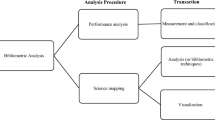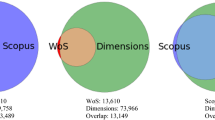Abstract
This research analyzes the coverage of Latin American and Caribbean journals in Google Scholar Metrics. It has identified the number of indexed journals by country and compared them with other databases (Scopus, Journal Citation Reports, and SciELO). The characteristics of publications are described based on research areas and subjects, impact (h5-index and h5-median), languages, periodicity, and productivity. Data from 8,205 journals from 24 Latin American and Caribbean countries were downloaded from Latindex. A Python script was used for automated titles search at Google Scholar Metrics, and 3070 (37.42%) journals were found. The journals from Brazil, Mexico, Colombia, Argentina, Chile and Cuba account for 88% of the total, and those in the arts & humanities, social sciences, and health & medicine account for 72%. Approximately 71% of journals are published by educational institutions and 75% have a periodicity of less than three issues per year. The impact is influenced by productivity and language, and the h5-index average is higher in the more productive journals and those published in English. Google Scholar Metrics is a relevant source for Latin America and Caribbean, since the broad coverage allows impact analysis for a larger number of journals. The limited resources for searching and filtering data and the lack of bibliographic control make it difficult to use for bibliometric purposes. Google Scholar Metrics is useful as an alternative source, and its limitations can be overcome with other tools.







Similar content being viewed by others
References
Barnes, C. (2017). The h-index debate: An introduction for librarians. The Journal of Academic Librarianship, 43(6), 487–494. https://doi.org/10.1016/j.acalib.2017.08.013
Bornmann, L., & Daniel, H.-D. (2009). The state of h index research. Is the h index the ideal way to measure research performance? EMBO Reports, 10(1), 2–6. https://doi.org/10.1038/embor.2008.233
Chinchilla-Rodríguez, Z., Zacca-González, G., Vargas-Quesada, B., & de Moya-Anegón, F. (2016). Benchmarking scientific performance by decomposing leadership of Cuban and Latin American institutions in Public Health. Scientometrics, 106(3), 1239–1264. https://doi.org/10.1007/s11192-015-1831-z
Chinchilla-Rodríguez, Z., Arencibia-Jorge, R., de Moya-Anegón, F., & Corera-Álvarez, E. (2015). Somes patterns of Cuban scientific publication in Scopus: The current situation and challenges. Scientometrics, 103(3), 779–794. https://doi.org/10.1007/s11192-015-1568-8
Collazo-Reyes, F. (2014). Growth of the number of indexed journals of Latin America and the Caribbean: The effect on the impact of each country. Scientometrics, 98(1), 197–209. https://doi.org/10.1007/s11192-013-1036-2
Collazo-Reyes, F., Luna-Morales, M. E., & Luna-Morales, E. (2017). Change in the publishing regime in Latin America: From a local to universal journal, Archivos de investigación Médica/Archives of Medical Research (1970–2014). Scientometrics, 110(2), 695–709. https://doi.org/10.1007/s11192-016-2207-8
Collazo-Reyes, F., Luna-Morales, M. E., Russell, J. M., & Pérez-Angón, M. A. (2008). Publication and citation patterns of Latin American & Caribbean journals in the SCI and SSCI from 1995 to 2004. Scientometrics, 75(1), 145–161. https://doi.org/10.1007/s11192-007-1841-6
Costa, H., do Canto, F. L., & Pinto, A. L. (2020). Google Scholar Metrics e a proposta do novo Qualis: impacto dos periódicos brasileiros de Ciência da Informação. Informação & Sociedade: Estudos. https://doi.org/10.22478/ufpb.1809-4783.2020v30n1.50676
Crespo-Gascón, S., Tortosa, F. S., & Guerrero-Casado, J. (2019). Producción de revistas científicas en América Latina y El Caribe en Scopus, Journal Citation Reports y Latindex en el área de los recursos naturales: Su relación con variables económicas, ambientales y de inversión en investigación. Revista Española De Documentación Científica, 42(1), 224. https://doi.org/10.3989/redc.2019.1.1533
Gonzalez-Pardo, R., Repiso, R., & Arroyave-Cabrera, J. (2020). Revistas iberoamericanas de comunicación a través de las bases de datos Latindex, Dialnet, DOAJ, Scopus, AHCI, SSCI, REDIB, MIAR, ESCI y Google Scholar Metrics. Revista Española De Documentación Científica, 43(4), e276. https://doi.org/10.3989/redc.2020.4.1732
Gu, X., & Blackmore, K. (2017). Characterisation of academic journals in the digital age. Scientometrics, 110(3), 1333–1350. https://doi.org/10.1007/s11192-016-2219-4
Hirsch, J. E. (2005). An index to quantify an individual’s scientific research output. Proceedings of the National Academy of Sciences of the United States of America, 102(46), 16569–16572. https://doi.org/10.1073/pnas.0507655102
Ibañez-Marti, J. J. (2018). La Ciencia en Latinoamérica: tendencias y patrones. Revista de la facultad de ciencias, 7(1), 23–39. https://doi.org/10.15446/rev.fac.cienc.v7n1.69409
Jacsó, P. (2012). Google Scholar Metrics for Publications: The software and content features of a new open access bibliometric service. Online Information Review, 36(4), 604–619. https://doi.org/10.1108/14684521211254121
Jamal, T., Smith, B., & Watson, E. (2008). Ranking, rating and scoring of tourism journals: Interdisciplinary challenges and innovations. Tourism Management, 29(1), 66–78. https://doi.org/10.1016/j.tourman.2007.04.001
Lancho-Barrantes, B. S., & Cantú-Ortiz, F. J. (2019). Science in Mexico: A bibliometric analysis. Scientometrics, 118(2), 499–517. https://doi.org/10.1007/s11192-018-2985-2
López-Cózar, E., & Cabezas-Clavijo, Á. (2012). Google Scholar Metrics: An unreliable tool for assessing scientific journals. Profesional De La Informacion, 21(4), 419–427. https://doi.org/10.3145/epi.2012.jul.15
López-Cózar, E., & Cabezas-Clavijo, Á. (2013). Ranking journals: Could Google Scholar Metrics be an alternative to journal citation reports and Scimago journal rank? Learned Publishing, 26(2), 101–113. https://doi.org/10.1087/20130206
López-Cózar, E.; Martín-Martín, A. Índice H de las revistas científicas españolas según Google Scholar Metrics (2014–2018). 4. ed. Granada, 30 out. 2019. https://doi.org/10.13140/RG.2.2.36649.13923
López-Cózar, E., Orduña-Malea, E., & Martín-Martín, A. (2019). Google Scholar as a data source of research assessment. In W. Glänzel, H. F. Moed, U. Schmoch & M. Thelwall. Springer handbook of science and technology indicators (W. Glänzel, H. F. Moed, U. Schmoch, & M. Thelwall (eds.)). Springer International Publishing. https://doi.org/10.1007/978-3-030-02511-3
López-Cózar, E., Robinson-García, N., & Torres-Salinas, D. (2014). The Google scholar experiment: How to index false papers and manipulate bibliometric indicators. Journal of the Association for Information Science and Technology, 65(3), 446–454. https://doi.org/10.1002/asi.23056
Machin-Mastromatteo, J. D. (2019). Latin American triple-A journals 2: The Venezuelan case. Information Development, 35(5), 839–845. https://doi.org/10.1177/0266666919877962
Machin-Mastromatteo, J. D., Tarango, J., & Medina-Yllescas, E. (2017). Latin American triple-A journals. Information Development, 33(4), 436–441. https://doi.org/10.1177/0266666917718138
Martín-Martín, A., Ayllón, J. M., Orduña-Malea, E., & Delgado López-Cózar, E. (2014). Google Scholar Metrics 2014: a low cost bibliometric tool. EC3 Working Papers, 17: 8 July 2014. arXiv:1407.2827
Minniti, S., Santoro, V., & Belli, S. (2018). Mapping the development of open access in Latin America and Caribbean countries. An analysis of Web of Science core collection and SciELO citation index (2005–2017). Scientometrics, 117(3), 1905–1930. https://doi.org/10.1007/s11192-018-2950-0
Moreno-Gil, S., Parra-López, E., Picazo-Peral, P., & Díaz-Domínguez, C. (2020). The dissemination of tourism scientific research in Latin American journals. A Bibliometric Study. Anatolia, 00(00), 1–16. https://doi.org/10.1080/13032917.2020.1795892
Palacios, M. (2017). The uncertainty of colombian scientific journals with Publindex. Colombia Médica, 48(4), 152–154. https://doi.org/10.25100/cm.v43i4.3789
Patalano, M. (2005). Las publicaciones del campo científico: Las revistas académicas de América Latina. Anales De Documentación: Revista De Biblioteconomía y Documentación, 8, 217–235. https://doi.org/10.6018/analesdoc.8.0.1451
Pinto, A. L., Do Canto, F. L., Gavron, E. M., & Talau, M. (2020). Periódicos científicos brasileiros indexados no Google Scholar Metrics. Informação & Sociedade: Estudos, 30(4), 1–18. https://doi.org/10.22478/ufpb.1809-4783.2020v30n4.57048
Repiso, R., Orduña-Malea, E., & Aguaded, I. (2019). Revistas científicas editadas por universidades en Web of Science: Características y contribución a la marca universidad. El Profesional De La Información, 28(4), 1–10. https://doi.org/10.3145/epi.2019.jul.05
Rodríguez Morales, A. J., Ochoa Orozco, S. A., & Tristán, P. M. (2014). Impact of Colombian health journals: Comparing Publindex versus Google Scholar Metrics, SciELO and SCOPUS. Revista Cubana de Informacion En Ciencias de La Salud, 25(1), 24–35. http://scielo.sld.cu/scielo.php?script=sci_arttext&pid=S2307-21132014000100003&lng=es&tlng=
Rodrigues, R. S., & Abadal, E. (2014). Scientific journals in Brazil and Spain: Alternative publishing models. Journal of the Association for Information Science and Technology, 65(10), 2145–2151. https://doi.org/10.1002/asi.23115
Romero-Torres, M., Acosta-Moreno, L. A., & Tejada-Gómez, M. A. (2013). Ranking de revistas científicas en Latinoamérica mediante el índice h: Estudio de caso Colombia. Revista Española De Documentación Científica, 36(1), e003. https://doi.org/10.3989/redc.2013.1.876
Vasen, F., & Vilchis, I. L. (2017). Sistemas nacionales de clasificación de revistas científicas en América Latina: Tendencias recientes e implicaciones para la evaluación académica en ciencias sociales. Revista Mexicana De Ciencias Políticas y Sociales, 62(231), 199–228. https://doi.org/10.1016/S0185-1918(17)30043-0
Vélez-Cuartas, G., Lucio-Arias, D., & Leydesdorff, L. (2016). Regional and global science: Publications from Latin America and the Caribbean in the SciELO citation index and the web of science. El Profesional De La Información, 25(1), 35. https://doi.org/10.3145/epi.2016.ene.05
Waltman, L. (2016). A review of the literature on citation impact indicators. Journal of Informetrics, 10(2), 365–391. https://doi.org/10.1016/j.joi.2016.02.007
Acknowledgements
We wish to thank the anonymous reviewers for their important comments and contributions. We are also grateful for the support of Thiago Magela Rodrigues Dias, professor at the Centro Federal de Educação Tecnológica de Minas Gerais (CEFET-MG), Heloísa Costa, adjunct professor at the Universidade Federal de Santa Catarina (UFSC), and Alexandre Ribas Semeler, data librarian at the Instituto de Geociências, Universidade Federal do Rio Grande do Sul (UFGRS).
Funding
The authors have no relevant financial or non-financial interests to disclose. All authors certify that they have no affiliations with or involvement in any organization or entity with any financial interest or non-financial interest in the subject matter or materials discussed in this manuscript. The authors have no financial or proprietary interests in any material discussed in this article.
Author information
Authors and Affiliations
Corresponding author
Ethics declarations
Conflict of interest
The authors have no conflict of interest to declare that are relevant to the content of this article.
Supplementary Information
Below is the link to the electronic supplementary material.
Rights and permissions
About this article
Cite this article
do Canto, F.L., Pinto, A.L., Gavron, E.M. et al. Latin American and Caribbean journals indexed in Google Scholar Metrics. Scientometrics 127, 763–783 (2022). https://doi.org/10.1007/s11192-021-04237-x
Received:
Accepted:
Published:
Issue Date:
DOI: https://doi.org/10.1007/s11192-021-04237-x




